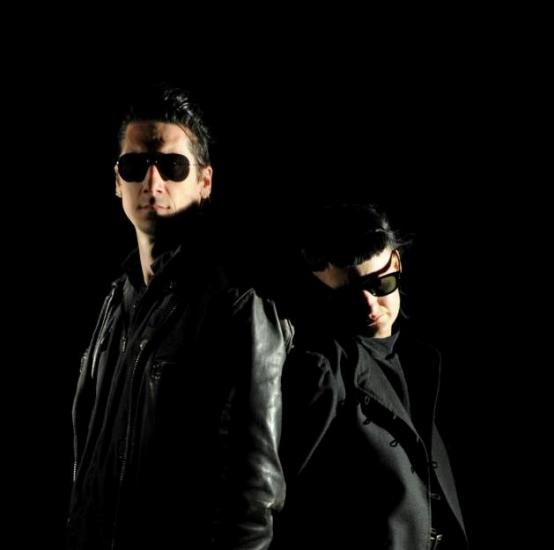 “Snarling electro-punk” is a good way of describing ADULT. as is “a snuff film version of Speak & Spell” which is what one keen observer said on ELECTRICITYCLUB.CO.UK’s Facebook about their new album ‘The Way Things Fall’.
“Snarling electro-punk” is a good way of describing ADULT. as is “a snuff film version of Speak & Spell” which is what one keen observer said on ELECTRICITYCLUB.CO.UK’s Facebook about their new album ‘The Way Things Fall’.
That has to be one of the quotes of the year and ELECTRICITYCLUB.CO.UK wished it had thought of it!
The fear of the outside world and relationships, the fear of opening up your heart and it being destroyed; these sentiments have very much inspired the dystopian demeanor of ADULT.
First finding notoriety with the spiky cult favourite ‘Hand To Phone’ in 2001, Detroit based duo Adam Lee Miller and Nicola Kuperus’ last album was 2007’s ‘Why Bother?’ and for a while they didn’t. Suffering from burn out following a long world tour, they spent some time spent away from music.
But the couple reconvened to record possibly their most accessible album yet. While still retaining their distinctive edge and unsettlement, the album’s mutant love songs have a magnetic charm. This is particularly evident on the fabulous single ‘Idle (Second Thoughts)’, a vibrant electro hybrid of GINA X PERFORMANCE and SIOUXSIE & THE BANSHEES.
The next single ‘Tonight, We Fall’ and its description of feelings as tangible objects that “stick to you, stick to me” is strangely heartfelt. There’s also the aggrieved resignation of ‘Nothing Lasts’ accompanied by a plethora of detuned synthesizer sounds while the haunting techno pop of ‘New Frustration’ and the pulsating ‘At The End Of It All’ are among the album’s other key tracks.
With a penchant for playing in the dark, ADULT. live shows are enjoyably detached affairs, paring their music to its barest bones. The pair chatted to ELECTRICITYCLUB.CO.UK about their new album…
The new album is much more electronic than your last one?
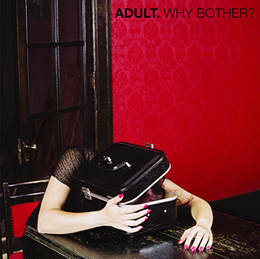 NK: We made a pretty conscious effort to not use bass or guitar.
NK: We made a pretty conscious effort to not use bass or guitar.
ALM: I don’t think so… one day we went in and thought “no guitar in any of these” – and we were writing so fast, we didn’t really pay attention after that.
NK: When we started writing the songs, we made a conscious effort to write songs which were more pop, more dance oriented. I think it’s because we’d had a break and the mood we were in – especially myself. At the end of making ‘Why Bother?’, I was very agitated and irritated and always p*ssed off.
ALM: It’s true.
NK: Yes, it’s definitely kinda true. I was just burnt out. For this record, I felt like I really wanted to enjoy listening to my own record. I think maybe that’s where not having the bass and guitar on there stems from – that desire to have more dance oriented tracks.
ALM: I agree with that.
Is there any kind of theme to this album, or are all the songs basically unrelated?
NK: Generally it was a lot more open. On the previous album for instance, our concepts were so specific you could literally say “this song is about this one woman and her history”. This new album was much more ambiguous, the emotions were stronger than the stories.
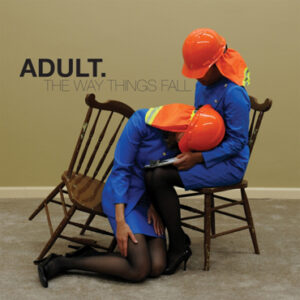 It’s interesting that you say the album is about fear of relationships: you have been in a relationship since the beginning of the band – is there something very personal in this album?
It’s interesting that you say the album is about fear of relationships: you have been in a relationship since the beginning of the band – is there something very personal in this album?
ALM: In a sense it’s about those kind of frustrations – that feeling where you’re so beat down, all you can do is try to figure out how to get yourself back up.
Do you both bring different qualities to the band? Do you have different strengths?
NK: I don’t know if we know the difference anymore. At this point in our lives and relationship together, it’s all so intertwined that it’s hard to separate. We’re working on a new video right now for the song ‘Tonight, We Fall’. Adam and I were building the set last night and we were like one machine, like an assembly line.
ALM: We started the band a year after we started dating. We don’t know…
NK: We don’t know how to operate any other way than making stuff together. Sometimes I think if we didn’t make stuff together, maybe we wouldn’t like each other. *laughs*
How does your live show compare to your recorded work?
NK: Basically, the songs have two levels. There is the very programmed analogue sequence type stuff and playable lines. The other half of the songs are backing tracks we create.
ALM: We translate the sound we have in the studio – where there’s a lot of vintage analogue gear, primarily – live, we travel with two newer analogue machines, and for what we can’t translate, we use a sampler. I play three keyboards on stage, Nicole sings and we have the backing machine. We’re no different to DEPECHE MODE really! *laughs*
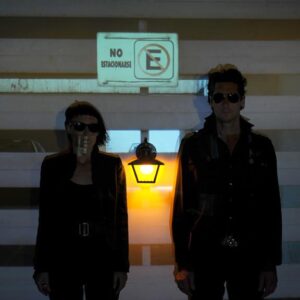 When putting together a live show, how do you choose what to play?
When putting together a live show, how do you choose what to play?
NK: We’ve been a band since 1997, we have numerous 12 inch records, several albums and over 100 original songs – that’s a lot of music. We really work hard to pull things from all different eras of our sound and try to make it a cohesive, sort of hour long wave of music. We spend a lot of time considering how each song goes together, how the sequencing works and creating arcs in our set. It’s in no particular order as far as chronology goes.
ALM: We’ll ask ourselves how a song from 2000 correlates with a song we just wrote: “do they make sense together, do they sound good together?” Sometimes we’ll go back and rework a track, restructure or even re-record some older songs to sound more cohesive. It’s probably my least favourite thing about being in a band.
Do you enjoy playing live?
NK: As long as it hasn’t been a long tour, I enjoy the live experience. This is what I love about doing short tours like the one in Europe – we’re only doing 4 dates. That makes it more special, it doesn’t become a dog and pony show – which I sometimes think touring is. There’s nothing wrong with going on a tour, I’m just not that type of musician. I don’t enjoy playing one night after next after. I prefer making things as opposed to performing them.
You’re both established visual artists – does this become a part of your shows as well?
ALM: No, I think we’ve always had this standpoint for our live set that it’s music – it’s not a performance in the sense that it’s not theatre or theatrical. How elaborate it is depends on logistics: where we’re playing and the venue. We’ve had some very specific light shows, video backdrops, fog and things like that – but at some shows, we don’t have the control over that.
NK: I sometimes feel like we’re touring the whole dog and pony show. Some musicians like to incorporate dance, theatrical aspects – that’s not how we operate.
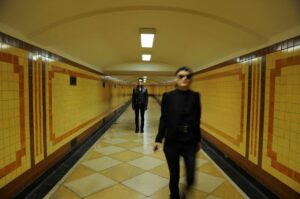 Do you connect with the crowd on stage, or prefer to stay aloof?
Do you connect with the crowd on stage, or prefer to stay aloof?
NK: It depends on night and mood, and if you want to reach out. Sometimes I just feel introverted and don’t want to say anything. If we could play in the dark and everyone in the room was also in the dark I think that would be ideal.
ALM: Maybe we’ll keep the lighting just at 10%. Maybe just have one flashlight. *laughs*
Would it be right to say you keep your art and music quite separate then? Has making a film given you the chance to combine the two in a way you’re comfortable with? How has it affected making the new album?
ALM: I know for myself, and I guess Nicole will agree, we both went to art school and we both do a lot of different disciplines. Nicole does photography and I’m painting: that’s what my majors were in. Making the film finally allowed us to express that in other media. Because of that, since we started writing again, our music has become more pure – there’s less baggage. It didn’t have to be six things to us; it could just be one thing. We only had one album, one specific goal: to write great music.
NK: ‘Why Bother?’ had more of a complicated narrative and we thought it had to have a single overarching concept. Whereas, this album just feels a lot more energised and free.
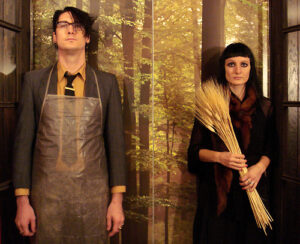 Earlier albums seem to have been influenced by particular writers or philosophers: JG Ballard, Philip K Dick… does this album have any particular literary or philosophical influences?
Earlier albums seem to have been influenced by particular writers or philosophers: JG Ballard, Philip K Dick… does this album have any particular literary or philosophical influences?
NK: Sometimes in the past, our albums were very obviously influenced by writers like Ballard and PK Dick, but not this album. We’ve been writing in a very isolated space, away from influences.
ALM: Going back to the subject of reaching the audience, I don’t want to *not* reach people. I think we suffer from a particularly artistic temperament… existential angst.
Does the writing process prove to be cathartic?
NK: Yes it’s definitely helpful. When we wrote this record, it was a frenzied-feeling writing process. We would write one song and then start immediately on another. In the end you felt like it was never ending and had to say “that’s enough, shut it off”.
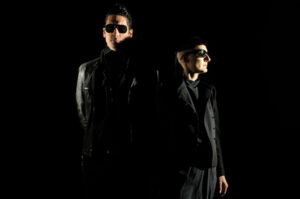 How do you write as a partnership – is it a democratic creative relationship?
How do you write as a partnership – is it a democratic creative relationship?
ALM: It’s different with every record. We can easily comment on the new record.
NK: This was definitely a very democratic process. We generally agree on stuff, although not always, that’s for sure – sometimes we each had to fight for what we wanted.
One good practice we have is that if a track is not coming together quickly, we’ll leave each other for periods of time in the studio. Then we can each have a go at trying to figure it out.
ALM: This does two things – it lets you try embarrassing, stupid things; let’s you fail a lot without someone listening, going “that’s terrible”. Secondly, you then have an objective second person who you can show things. If you’ve been working on a bassline for three hours and you start to become really delusional, it’s great to have someone else going “it’s good” or “no it’s crap”. We’re good at not getting offended – I think that’s from art school – you’re trained to go through the process of critique.
After making a film, why did you decide to make another album? Do you still believe in the album format?
NK: We didn’t want to make another album.
ALM: We didn’t intend to.
NK: People listen to music in a totally different context now, where you buy the song you want, so what is the importance of the album? We wrote fourteen songs and ten are on there…
ALM: …or nine. It just felt like an album. It felt like these songs had to go together for our own brains, regardless of how someone else wants to listen to them. There was a period of time where I worried a little too much about other people. When I go to iTunes, I buy albums… I don’t shuffle, I listen to them in order, and I’m glad about that. I don’t care if someone only likes one song or puts the album on shuffle – none of that. That’s their business. I think about what I’m into. I’ve always operated that way and it works for me. I figure if I like it, there’s a good chance other people might be into it as well.
Did you feel yourselves part of a scene at all when you began, when electroclash was becoming fashionable? Do you listen to what sounds are around in electronic pop now?
NK: I don’t know if we’re influenced by what’s going on.
ALM: I think we used to not be and that’s what happened to us. We got too wrapped up in how the outside world reacted. We’re much better as isolated people.
NK: I do think we work better when isolated.
ALM: We talk about what we did, and did very publically. We pushed all of our limits. We wanted to see how far north, south, east and west we could go and a few times we crossed our own limits. I have no regrets about that, how we grew as artists.
What we’re making now is a record that could only have been made with experience. We know our limits now, we’ve done all of our experimentation. We know what we like and enjoy and that’s the record we made.
NK: We’re conscious of certain things that we were unhappy with in the past – even down to playing live shows. I don’t want to burn out again.
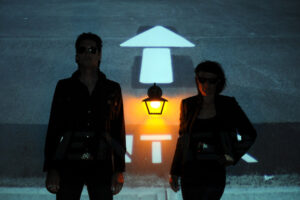 You say you’ve finished experimenting – is there a danger you could become too comfortable and lose the desire to innovate?
You say you’ve finished experimenting – is there a danger you could become too comfortable and lose the desire to innovate?
ALM and NK: Yeah, that could happen.
ALM: I don’t care if I’m complacent or not.
NK: I doubt it, knowing our personalities.
ALM: We’re not going to say anything but we’ve thought about what we’ll do if we make another album.
NK: Maybe after this we won’t be in the mood to write another album – or maybe we will feel inspired. I don’t know.
ALM: We had a long meeting about what we liked and didn’t like about the music industry and made very specific outline of traps and snares not to fall into again.
NK: To operate on a certain scale in the music world doesn’t work for us.
ALM: A good example, for instance, is how we had a very clear meeting with our label Ghostly saying “don’t work with us if you expect us to do an exhausting tour for this album. Don’t put it out if that’s what you expect”. Maybe it’s not what they expect, maybe it’s expectations you put on yourself. Another example, we tried being a three piece band for one album and then stopped. We’re still all really good friends but it just wasn’t who we are. This is more like an outgrowth… like an art project – it’s ours. It doesn’t work if we bring in someone else.
ELECTRICITYCLUB.CO.UK gives its grateful thanks to ADULT.
Special thanks to Debbie Ball at Create Spark
‘The Way Things Fall’ is released by Ghostly International on CD, download and vinyl
http://ghostly.com/releases/the-way-things-fall
Interview by Nix Lowrey
Additional material by Chi Ming Lai
26th June 2013

Follow Us!